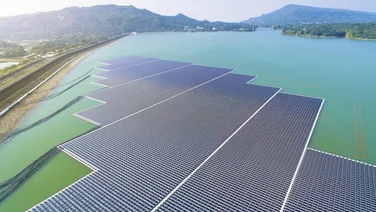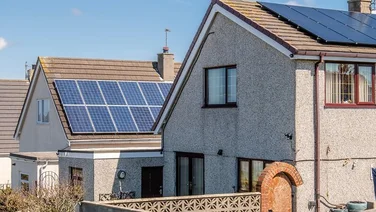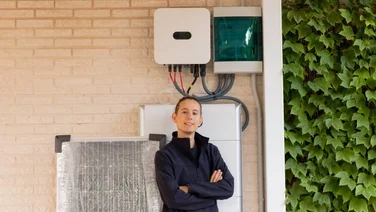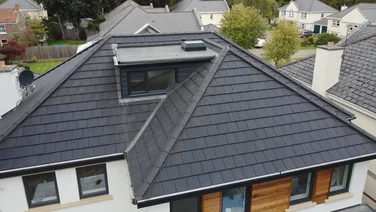- Solar panels have cost around £6,333 on average in 2025 so far
- Solar panels save the average home around 1 tonne of CO2 per year
- Sixty-five per-cent are likely or very likely to buy or rent a property with solar panels
Buying a house is a big thing to do. The good news is that low-carbon technology, such as solar panels, can bring down some costs in the long run, so theyre a good thing to look out for when youre in the market for a property.
Solar panels can also increase your propertys value, if you choose to sell it on, so buying a house with solar panels already installed can be a good investment.
But when it comes to buying a house with solar panels, it can be quite daunting, but weve got you covered. Here are the best tips for buying – and selling – a property with solar panels, and how to deal with any issues you might encounter.
If youre unsure about the benefits of solar panels, think of Shirley Paterson, a homeowner in Fife, Scotland. She installed solar panels over a decade ago and powers her home and electric vehicle home chargers using 95% of her solar energy. Just 5% is sold back to the National Grid.
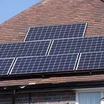
Install solar panels
Use the button below to hear from our trusted solar panel installers for a free, no obligation quote.
Should I buy a house with solar panels already installed?
Absolutely. In almost all cases, buying a house with solar panels already installed makes total financial and environmental sense, especially as the cost of solar panels continues to decline.
In fact, according to the latest data from the MCS Dashboard, solar panel installations have cost around £6,333 on average in 2025. This figure will fluctuate and change month-to-month. For example, in April, the average cost of MCS-certified solar panel installations was around £8,500. Still, this is quite a decline from 2024s peak of more than £8,900 and a bigger drop since 2023s pricing of more than £10,000.
If youre worried about how solar panels will look on your home, remember that 65% are likely or very likely to buy or rent a property with solar panels, according to our 2024 National Home Energy Survey.
Theres also the environmental benefits to consider. Solar panels save the average home around 1 tonne of CO2 per year, 15% of your annual carbon footprint.
If this isnt enough, theres also the financial benefits to consider, which well go into more detail below.

Will you save and make money?
Solar panels have the following financial benefits:
- Solar panels provide free energy year round, saving the average three-bedroom household £4,335 after 25 years
- Usually, it takes an average of 15.66 years to break even on solar panels but if theyre already installed, youll have saved the installation and upfront costs
- Youll only use about half the electricity youd otherwise use from the National Grid and youll receive money from the Smart Export Guarantee (SEG). This means each year, youll have up to £200 extra in your bank account.
- If your new home had its solar panels installed while the governments Feed-in Tariff was active, youll need to consider if you should continue these payments or switch to the SEG.
Solar panels also need very little maintenance, meaning you wont need to shell out too much once youve moved in. All you need to do is make sure nearby trees arent covering them and get a list of maintenance checks from the installer.
These tasks will need carrying out every so often, but the main task is to check the inverter is working and not indicating a fault. Inverters will fail eventually and will need replacing.
Yes, in almost all cases, any feed-in tariff agreements should transfer to the new owner, and likewise, it should be simple to take on a Smart Export Guarantee contract signed by the previous owner.
Once the process is completed, the maintenance costs will transfer to you or the new owner but thats the same with any part of your new home.
What if I buy a house with leased solar panels?
Buying a house in this situation can be trickier as some mortgage lenders will reject your application if part of the property is owned by a company and you cant buy the house without the panels.
You shouldnt have any problems if:
- The installation company is accredited by the MCS
- The installation itself was approved and is insured
- You can remove the panels without incurring penalties for missed Feed-in Tariff payments
Your solicitor will go through the lease details and contact the installation company to see whether theyve signed the panels over to an agent.
If they have, the agent may charge a fee when the property is sold. Who pays that fee is up to you to decide with the seller.
Your solicitor will also check whether the houses owner needs permission from the installation company to extend the property, or even sell it. Theres no reason why the installation company wouldnt agree to a request to sell the house but if the company has ceased to exist, it can be difficult to find the current owner.
In all cases, listen to your solicitors legal advice.
You wont have to worry if the solar panels have been purchased through the Solar Together initiative, which is a group-buying scheme and the house will fully own the solar panel system.

What questions should you ask before committing to the house purchase?
Get some answers to the following questions before you commit to your new homes solar array. You should have all the information about any potential inconveniences before you start using the panels.
The list of questions are:
- Does the house come with a solar battery? Solar batteries can store the energy your panels produce, meaning zero waste. Solar batteries cost £2,000-£8,000, so its quite the saving if the house already has one.
- Are the solar panels securely fitted and effectively connected? If you pay someone to ensure your panels are safe, itll eat into your solar profits. Also, if the panels arent connected properly, you wont receive as much as you should and neither will the company youre selling extra power to for SEG payments.
- What are the installation details? Ask when the panels were installed to get an idea of how effective theyll be at providing you with clean, free energy and their remaining lifespan. Remember to ask which company installed the panels and ask for the contract, too.
- When does the warranty expire? Generally, a solar panel warranty is 25 years and youll continue to receive energy until then, but keep its expiration date in mind. The European Union guidelines are still in place, too, if they need removing and manufacturers and importers are legally required to dispose of them.
Summary
- In almost all cases, it makes total financial and environmental sense, especially as the cost of solar panels continues to decline.
- According to the latest data from the MCS Dashboard, solar panel installations have cost around £7,500 on average in 2025. This figure will fluctuate and change month-to-month
- Solar panels save the average home around 1 tonne of CO2 per year, 15% of your annual carbon footprint.
- You should have all the information about any potential inconveniences before you start using the panels.
- Buying a house in this situation can be trickier as some mortgage lenders will reject your application if part of the property is owned by a company and you cant buy the house without the panels.

